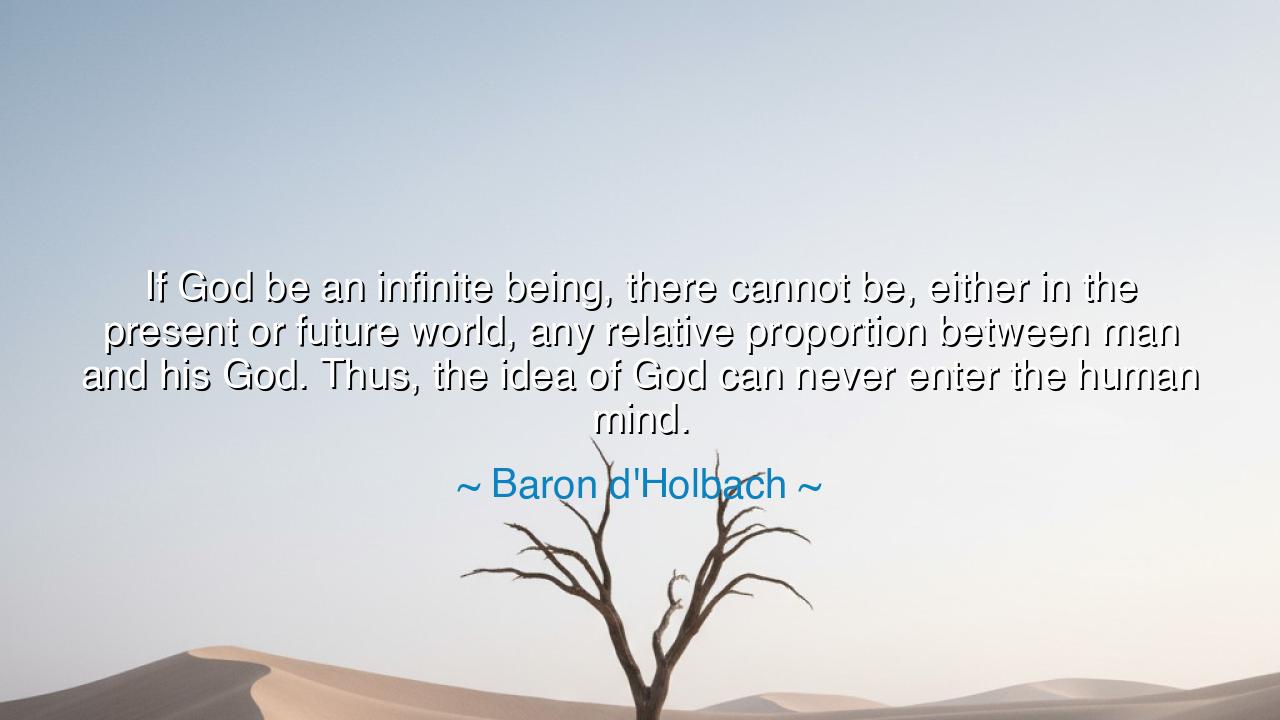
If God be an infinite being, there cannot be, either in the
If God be an infinite being, there cannot be, either in the present or future world, any relative proportion between man and his God. Thus, the idea of God can never enter the human mind.






"If God be an infinite being, there cannot be, either in the present or future world, any relative proportion between man and his God. Thus, the idea of God can never enter the human mind." These words from Baron d'Holbach speak to a profound philosophical question that has challenged humanity for millennia: the nature of God and the limits of human understanding. D'Holbach suggests that if God is indeed infinite, then the idea of God—as a concept graspable by the human mind—becomes inherently impossible. How can something that transcends all boundaries, that exists beyond time, space, and even comprehension, be understood or even imagined by beings so finite and bound by the very limitations of existence? It is, as d'Holbach asserts, an insurmountable gap between the divine and the human.
In the ancient world, philosophers grappled with similar questions. Plato, in his writings, often spoke of the realm of forms—an abstract, ideal world that exists beyond the physical world. He argued that the ideal—whether it was beauty, justice, or goodness—could never be fully understood in its purest form by human beings because of our inherent imperfection. Plato’s idealism was grounded in the belief that humans could never fully grasp the truth of the universe, and thus the divine, in its purest sense, was beyond our capacity to fully comprehend. Like d'Holbach, Plato understood that there is an infinite divide between the finite nature of humanity and the infinite nature of the divine. This philosophical tension between the finite and the infinite is timeless and universal.
Consider the great ancient philosopher Aristotle, who sought to reconcile the idea of a perfect God with the realities of human existence. Aristotle’s Unmoved Mover, a concept introduced in his work Metaphysics, presented God as a perfect, eternal being who, through sheer will, set the universe in motion. However, Aristotle, too, acknowledged that the human mind could never fully comprehend such an entity. His God was not a personal deity concerned with human affairs but rather a principle of movement and perfection. In this sense, Aristotle’s conception of God mirrors d'Holbach’s—it is something inaccessible, beyond the realm of human understanding, and yet necessary for the existence of everything else.
The Christian doctrine, too, has long grappled with the paradox of the infinite God and the finite human. In the Bible, it is written that God’s ways are beyond understanding, and that humans are incapable of comprehending His fullness. Even in the most profound religious experiences, whether in mysticism or prayer, there is a recognition of a gulf between the divine and the human. Saint Augustine, in his writings, spoke of the infinite God as a mystery to be worshipped, but never fully understood. His famous words, “Our hearts are restless until they rest in You,” reflect the infinite yearning that human beings experience for the divine—a yearning that can never be fully satisfied in this life, but only longed for.
Yet, d'Holbach’s statement also challenges us to think about the limits of human knowledge. If the idea of God cannot truly enter the human mind, what does that mean for the way we understand the divine? The lesson that emerges is one of humility—recognizing the limits of our understanding and accepting that not all mysteries can be solved. In an age of technological progress and scientific enlightenment, this lesson is crucial. Humanity, with all its advances, cannot claim to have a complete understanding of the universe, let alone of a God that may transcend the very fabric of time and space.
In practical terms, d'Holbach’s reflection calls us to consider the humility required in our own lives. We must acknowledge the limits of our knowledge and embrace the mystery of existence. Just as d'Holbach posits that the infinite can never truly be understood by the finite human mind, we must recognize the profound beauty in the mysteries we face every day. Whether in our spiritual pursuits, our scientific explorations, or our personal quests for meaning, we are constantly reminded that some truths are beyond our comprehension. Let us seek wisdom, not to control or understand everything, but to live with the recognition that the world is full of mysteries that inspire awe, and that our greatest strength lies in our acceptance of the unknown.
Finally, the practical action we should take is one of openness and reflection. Embrace the fact that knowledge has limits, and that sometimes the greatest wisdom comes from recognizing what we do not know. Just as philosophers throughout history have contended with the nature of the divine, so too should we remain open to the mysteries that unfold before us, allowing our lives to be shaped not by the quest for all answers, but by the appreciation of the questions themselves. Let us live with humility, knowing that the vastness of existence will always hold depths beyond our reach, yet richness beyond measure.






AAdministratorAdministrator
Welcome, honored guests. Please leave a comment, we will respond soon